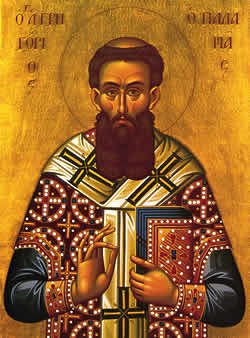In the last issue of this article, I began sharing thoughts of Gregory Palamas. It is fitting that I continue sharing his thoughts since on this second weekend of the Great Fast we commemorate the Church declaring his teachings to be truly representative of our faith.
One of the most delightful pictures Gregory uses is this: through the deification of Christ’s human nature, the “first-fruits of our substance” were deified, and a new root” was created, which is capable of instilling life and incorruptibility into its shoots. By God actually joining Himself to humanity through the incarnation of Second Person of the Trinity, humanity was radically changed.
For Palamas, as well as Athanasius and other Fathers, any diminution of the divine or human nature of Christ is not just a question of theology, it relates to anthropology as well. If Christ Himself were a creature, then He could not have brought about union with God; on the contrary, Christ would have been in need of union Himself. Indeed Gregory strongly opposed any Christologies, that is any systems of thought about Christ, with those tendencies.
While Gregory’s view of salvation builds on the incarnation, it also includes the action of the Holy Spirit. Taking note of Paul’s letter to the Romans that teaches that the love of God flows into the hearts of the faithful through the Holy Spirit, Palamas writes: “Not through rational thought, but through the Holy Spirit within us do we achieve that experience of love and the gifts it bestows.” He asserts that Christ could not have entered the church after His ascension had the Holy Spirit not already deified Christ’s human nature in the act of God’s incarnation.
The grace of the Holy Spirit penetrates the soul of the human being because it is uncreated. Gregory asserts this position because “no created thing may unite with the human soul”. Indeed it is his position that the “faithful who participate in the uncreated grace of the Spirit achieve a lasting regenerative quality and are rendered spiritual.”
As we know, the Eastern Church, in her understanding of the true faith, asserts that when God, Who is Triune in nature, interacts with His creation He does it as Triune – all Three Persons are involved. He creates through His Word – the Second Person – and the Holy Spirit – the Third Person – accomplishes the task, in a manner of speaking. Our God is One God in Three Persons. So obviously, the deification of the human nature of Christ was accomplished through the power of the Holy Spirit.
Our Church’s approach to communion expresses this: We ask the Father, repeat His Words as expressed by His Son, and invoke the Holy Spirit to accomplish it.

